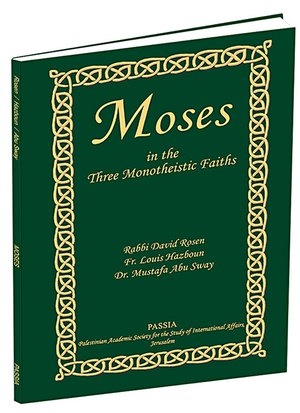Moses in the Three Monotheistic Faiths
This book compiles three papers – one each by a Muslim, a Chris¬tian and a Jewish scholar - on Moses/Musa. The papers were presented as part of the 2003 activities of PASSIA’s Religious Studies Unit. Authors include Rabbi David Rosen (Jewish perspective), Father Louis Hazboun (Christian perspective), and Dr. Mustafa Abu Sway (Muslim perspective). A selected bibliography with further reading sources (in English) is also included.
Overview
Dr. Mahdi Abdul Hadi
Head of PASSIA, Jerusalem
When we conduct interfaith dialogue it should be with the realization that its aim is not to choose between different faiths, or to emphasize differences between various schools of thought, but to stress the responsibility of scholars and religious leaders to explain their beliefs and positions, especially in times of crisis, and to resist the temptation to depict certain ideas in a negative if not distorted way.
In today’s environment one might view Moses’ actions such as the killing of one person whilst defending another as murder, or unjustified violence and maybe even terrorism. Others will not go to that extreme but will find a way to explain or excuse his actions. The danger is that the episode may be taken out of context and used as a weapon to attack or label others. This leads us to the most challenging aspect of such a dialogue, intra-faith dialogue, or that amongst a single faith group concerning their holy text and its various interpretation, which will inevitably lead to different schools of thought.
There are differences in the detailed stories about Moses in the texts of the three monotheistic faiths and historians disagree on facts such as when Moses lived. For example the date of the exodus from Egypt is said to be either in 1495 BC, 1290 BC, 1224 BC, 1215 BC or 1204 BC. In the various texts Moses is said to have married the daughter of a priest who was either one of two sisters or one of seven. There are other differences as well regarding the specific facts of Moses’ life.
However when we read the Torah, Bible or the Qur’an, it is Moses personality that is the most striking feature of the story and the interpretations put on the various events of his life, not the factual differences between the accounts. It is the wisdom to be found in each religion, the relevance of the story of Moses to how we live our lives today that is important. By learning about how the story of Moses is presented in each religion we can understand more about his message and about his successes and failures.
A confident rabbi can be critical about Moses, just as a Christian priest who is too loyal to the text of the Bible cannot separate himself from the strong words in it, because God’s words are so powerful and so convincing to him that he cannot live without them or distance himself from them. The key to engaging in successful interfaith dialogue is to acknowledge that other interpretations are possible and that there can be much to be gained from being prepared to listen to the stories of others. There is room for others to draw a line between what is history, legend or faith.
The Muslim is here to share with the Christians and the Jews the fact that he or she believes in Moses too, and aims to respect and honor all the prophets without exception. Yet he or she wants enjoy the story as it is revealed in various verses of the Qur’an and not just from one place, and to take pride and joy from knowing it and learning more about it. This process of learning is not complete but is ongoing; more is being learned all the time, especially through dialogue between scholars.
The aim of the PASSIA religious dialogue sessions is to bring Christians, Jews and Muslims together and encourage them to share with one another their respective holy books and traditions. The aim is to promote harmony and co-existence by demonstrating that although factual differences are to be found in each text, these should not be obstacles to good relations or something which others are demanded to endorse and approve. What is important is the search for wisdom and understanding common to all. Representatives of each faith have much to gain by sharing their holy books and interpretations with one another and by doing so they can enrich and strengthen their own faith.
A key goal of such a dialogue is to maintain harmony and to avoid clashes or disputes. We cannot ignore the fact though that we will come across those who are either extremist or fundamentalist, in all of the three faiths. But none of them can impose on the others their version of a story or a text, nor can they resign and leave the ‘house’ because most of them will claim they are responsible for defending what they believe. The great challenge we now face is to ensure that no one person or group hijacks religion or dictates to others his or her interpretations.

